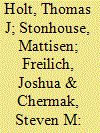| Srl | Item |
| 1 |
ID:
178932


|
|
|
|
|
| Summary/Abstract |
Over the last two decades, there has been a massive increase in research examining terror and extremist-related violence. Few have considered the extent to which these same groups may engage in attacks against digital infrastructure and the Internet, whether through hacking or other methods. The absence of empirical evidence calls to question the nature and dynamics of cyberattacks performed by extremists and ideologically motivated actors. This study attempted to address this gap in the literature through a qualitative investigation of 26 attacks performed by far-left groups against targets in the UK, US, and Canada from 2000 to 2015. This data was compared to physical attacks documented in the Extremist Crime Database during the same period. The findings demonstrated that there was an increase in cyberattacks during a period of decreased physical violence by far-left groups. Additionally, there was some parity in the targets of far-left groups on- and off-line, with similar motivations to cause harm to or embarrass businesses, government organizations, and individuals. The implications of this study for our understanding of terror and future research were discussed in detail.
|
|
|
|
|
|
|
|
|
|
|
|
|
|
|
|
| 2 |
ID:
120436


|
|
|
|
|
| Publication |
2013.
|
| Summary/Abstract |
Few studies have explored the factors that distinguish violent from nonviolent far-right hate groups. We examine four categories of factors on hate groups: (1) Organizational capacity, (2) Organizational constituency, (3) Strategic connectivity, and (4) Structural arrangements. Age and size, groups in conflict, groups led by charismatic leaders, groups that advocated for leaderless resistance tactics, and region increased a group's propensity to commit violence. Groups that published ideological literature were significantly less likely to be violent. By identifying factors that distinguish violent from nonviolent groups, this study helps us better understand characteristics of violent far-right hate groups in the United States.
|
|
|
|
|
|
|
|
|
|
|
|
|
|
|
|